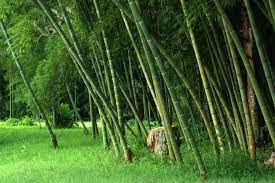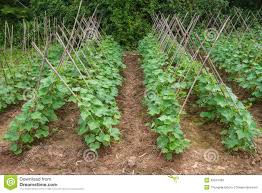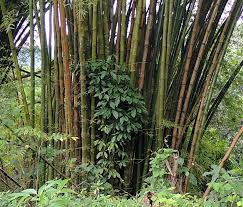![]()
If you’ve landed on this article page, you’re probably searching for a
good business idea—an idea that’s light on the pocket but heavy on
returns, promising both a fulfilling journey and potential profit.
|
How To Start A Lucrative Bamboo Farming in Nigeria
Bamboo farming is gaining popularity in Nigeria
due to its potential as a sustainable and versatile crop.
Bamboo is a fast-growing and renewable resource that can be used
for a variety of purposes such as construction, furniture, and
paper production. In Nigeria, bamboo is found in various parts
of the country, including the Southeast, Southwest, and
North-Central regions.
According to the Food and Agriculture Organization (FAO), Africa
has over 4 million hectares of bamboo forest, which represents
approximately 4% of the world’s bamboo resources. Nigeria is
estimated to have about 800,000 hectares of bamboo forest,
making it one of the largest bamboo resources in the region.
Bamboo farming can provide economic benefits to rural
communities by creating jobs and generating income. It can also
contribute to environmental sustainability by promoting
reforestation, reducing deforestation, and mitigating the
effects of climate change. Overall, bamboo farming has the
potential to be a valuable and sustainable industry in Nigeria
Business Opportunities In Bamboo Farming In Nigeria
Bamboo furniture production: Bamboo is a popular material for
furniture, and bamboo farming can provide a steady supply of raw
materials for the production of bamboo furniture.
Bamboo charcoal production: Bamboo charcoal is a popular product
used for cooking and air purification. Bamboo farming can
provide a source of raw materials for bamboo charcoal
production.
Bamboo flooring production: Bamboo flooring is a popular
alternative to traditional hardwood flooring. Bamboo farming can
provide a source of raw materials for bamboo flooring
production.
Bamboo paper production: Bamboo is a popular material for paper
production due to its fast growth and durability. Bamboo farming
can provide a steady supply of raw materials for bamboo paper
production.
Bamboo craft production: Bamboo is a versatile material that can
be used to create a wide range of crafts, from baskets to
jewelry. Bamboo farming can provide a source of raw materials
for bamboo craft production.
Bamboo shoot production: Bamboo shoots are a popular food item
in many parts of the world. Bamboo farming can provide a source
of raw materials for bamboo shoot production.
Bamboo plant propagation: Bamboo farming can also be a source of
income through the sale of bamboo plants for landscaping or
other purposes.
Bamboo garden design and maintenance: Bamboo is a popular
landscaping plant due to its aesthetic appeal and fast growth.
Bamboo farming can provide an opportunity for entrepreneurs to
offer bamboo garden design and maintenance services.
Bamboo-based medicine production: Bamboo has been used in
traditional medicine for its healing properties. Bamboo farming
can provide a source of raw materials for the production of
bamboo-based medicines.
Bamboo-based cosmetics production: Bamboo is used in the
production of cosmetics due to its antioxidant and
anti-inflammatory properties. Bamboo farming can provide a
source of raw materials for the production of bamboo-based
cosmetics.
Bamboo-based textile production: Bamboo is a popular material
for clothing and other textile products due to its softness and
breathability. Bamboo farming can provide a source of raw
materials for bamboo-based textile production.
Bamboo-based construction materials: Bamboo is a durable and
sustainable alternative to traditional construction materials.
Bamboo farming can provide a source of raw materials for
bamboo-based construction materials.
Bamboo-based energy production: Bamboo can be used as a source
of biomass energy through the production of bamboo pellets or
other forms of fuel. Bamboo farming can provide a source of raw
materials for bamboo-based energy production.
Bamboo-based animal feed production: Bamboo leaves and shoots
can be used as animal feed for livestock and other animals.
Bamboo farming can provide a source of raw materials for
bamboo-based animal feed production.
Bamboo-based environmental restoration: Bamboo is known for its
ability to absorb carbon dioxide and prevent soil erosion.
Bamboo farming can provide an opportunity for environmental
restoration and conservation efforts.
How To Start Bamboo Farming And Production In Nigeria and
Africa: A Step by Step Guide
1). Acquire Knowledge:
Farmers or agropreneurs interested in bamboo cultivation need to
acquire more than just the basic knowledge of cultivation and
management process. If possible, seek out the expertise of an
experienced bamboo farmer or consultant. The appropriate
training and information are invaluable in bamboo farming.
2). Sufficient Capital:
Another thing to do before cultivating bamboos is to gather
adequate finances required to sufficiently run a bamboo
plantation. The farming budget should include money to buy and
prepare farmland, cash to hire farm machinery and farmhands, and
money to purchase the best variety of bamboo seedlings,
fertilizers, pesticides, and fungicides.
3). Suitable Land:
Bamboo cultivated for commercial purposes requires considerable
space of land. Soil testing should be conducted to check for
acidity. Liming is a vital step in preparing non-acidic soil
types for bamboo farming. The right soil-balance ranges from
5.5-7.5 pH level. A water-retentive soil in areas with modest
rainfall and sufficient sunlight are crucial factors for its
survival.
4). Select The Right Bamboo Species:
The species of bamboo selected should be uniform with the
purpose for which it is cultivated. It should also be suitable
for the soil and climatic conditions of the farmland’s location.
Ask pertinent questions from trusted suppliers to double check
and prevent unnecessary risk. Find the best varieties of bamboo
seedlings or node cuttings from seedlings distributors or an
agricultural facility around living areas.
5). Propagation:
Plant seedlings or node shoots of clumping bamboo 3 to 4 apart
to provide adequate space for foliage spread. On the other hand,
running seedling would do well with a 5 to 7 space width.
However, for faster but less dense foliage, few varieties are
planted 5m or two feet apart. Planting bamboo side by side will
hinder growth rate.
Running bamboo grows fast, adding a minimum in a year while
clumping lag behind at 1 foot per annual growth rate. It’s
important to note that the rate of bamboo growth depends on the
climatic condition of its location.
6). Maintenance And Harvest:
Bamboo farmers enjoy cultivating the plant because of its
resistance to drought, pests, and diseases. It is also highly
adaptable to most soil types but patience is required in the
cultivation of this crop due to its perennial nature.
It’s important to know the right maintenance process for a
particular bamboo variety to ensure high yield at harvest.
Although this plant requires little moisture, areas of moderate
rainfall or bi-weekly irrigation in drier climates will likely
be the difference between bountiful and mediocre yields.
Starting a bamboo farm requires proper planning, research, and
execution. There are different types of bamboo species suitable
for different purposes, and farmers should choose the best type
for their intended use. Additionally, bamboo farming presents
various business opportunities, including bamboo processing,
furniture making, and construction materials.
Profitability: Naturally, the cost of bamboo rises as it grows.
At different stages, you can make money in this business even by
selling seedlings. A young tree can produce three to four shoots
within two months. During the next season, the mother plant and
the young shoots would have brought three to four shoots each.
In about four years, the plant would have produced 80 canes and
80 canes multiplied by 200 for an acre is 16,000. Assuming a
cane goes for N100 each, that means 100×16,000 which is equal to
N1,600,000 annually, after four to five years of plantation and
this figure will keep repeating every season.
Of course the price of bamboo increases by age and the ones for
staking can be harvested in three to four years. However, that
of pole and bridge construction has to be left for about six
years. You can start a bamboo nursery and sell the seedlings to
prospective farmers.
Market: There is a huge market for bamboo in the country and
this is because it has inexhaustible usage. But you can place a
market value on it by making artistic materials for sale to
institutions, such as; chairs, poles, toothpicks, charcoals
supply for export, matches among others.
Knowledge: Like in any business and same with growing bamboo
successfully, there is a need for the right training and in
depth knowledge of the processes involved in cultivation and
management. Seek the advice of a bamboo farmer with experience.
Bamboo has the potential to provide both ecological and economic
benefits in Nigeria. Ecologically, bamboo can help to mitigate
climate change by sequestering carbon and improving soil
quality. It can also help to prevent soil erosion in flood-prone
areas and Nigeria and provide a habitat for wildlife.
Additionally, bamboo can be used to restore degraded land such
as crude oil-polluted areas in the Niger Delta region of
Nigeria, and improve the livelihoods of local communities
especially those in riverine communities in the country.
Get our practical training guide on how to set up a lucrative
Bamboo Farming Business in Nigeria. Our comprehensive guide
covers everything related to Setting up the farm.
You will get first-hand
information about the success secrets and marketing strategies
deployed to achieve business success
|







